Managing a team is no longer just about overseeing people. In 2025, with constant change, it requires someone who’s more than just a leader. A true leader who can handle the complexities of human behavior, boost morale, and lead with empathy.
If you’re reading this, you’ve likely faced one or more challenges. For example, employees aren’t engaged anymore, or they have confusion about their expectations. You might have tried different management styles, but still feel like something is missing.
In fact, 42% of employee turnover can be prevented with the right strategy. However, if managers are not aligned with the right skills, they often avoid it. So, you need skills that convert problems into solutions without escalating the situation.
In this blog, you’ll get exactly those top leadership and people management skills that every manager needs to master to lead their teams truly.
Key Takeaways
- Communication is not just speaking; it’s about listening and connecting with your team.
- Emotional intelligence is the key to handling team dynamics and resolving conflicts with empathy.
- Delegation and trust help your team to take ownership and thrive.
- Feedback should be real-time and actionable, building continuous growth.
- Investing in your team’s development, coaching, and mentoring leads to long-term success.
What is People Management and Why Does it Matter?
Effective people management begins with delegating tasks and closely monitoring deadlines to ensure timely completion. However, today, it is defined as the skill that needs effective leadership along with technical expertise. It also requires emotional intelligence, clear communication, and the ability to connect with employees on a human level.
Why do Leadership and People Management Skills Matter?

In short, without these skills, you risk low morale, decreased innovation, and high turnover. These issues lead to a lack of accountability, strained team dynamics, and ultimately, a failure to meet organizational goals. However, when mastered, these skills can convert your team into a cohesive and motivated unit.
Here’s a more detailed listicle on the importance of people management skills:
- Increased Productivity: Engaged employees are 21% more productive.
- Higher Employee Retention: Effective people management enhances retention by cultivating a supportive and inclusive work environment.
- Enhanced Collaboration: Teams with strong leadership collaborate better and are more innovative.
- Better Performance: Employees who feel valued perform at higher levels and take ownership of their work.
- Reduced Turnover Costs: Purposeful leadership helps mitigate costly issues, such as the $438 billion lost annually due to turnover.
Maybe you’ve been frustrated by the lack of engagement and communication from your team despite your best efforts? You’re not alone, and it’s time to take a closer look at the specific leadership and people management skills that can rewrite your managerial skills.
9 Must-have Key People Management Skills Every Leader Needs
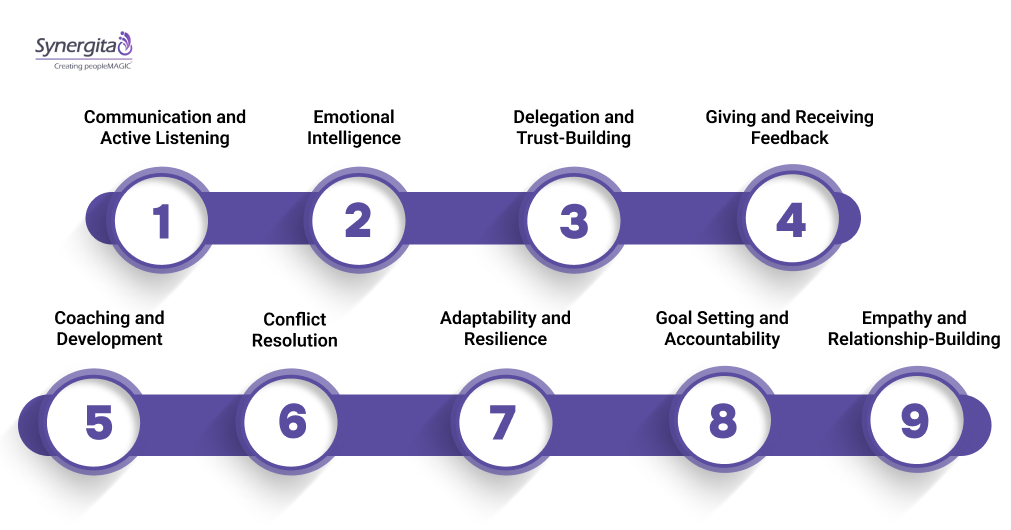
Mastering leadership skills requires practice, patience, and the right tools. Missing out on any of these could risk your team’s productivity and cohesion. So, to stay ahead of your competitors, you won’t want to skip this!
Let’s walk you through the nine people management skills you need:
1. Communication and Active Listening
Great communication starts with listening, genuinely hearing your team’s concerns, ideas, and feedback. Leaders who actively listen build trust and validate that their team’s voices are heard and valued. Mastering communication means being clear, transparent, and empathetic, adapting your message to suit the diverse needs of your team.
Tip: Use communication tools like Slack or Microsoft Teams to ensure everyone stays informed and engaged.
2. Emotional Intelligence (EQ)
Emotional intelligence is about understanding and managing both your own emotions and the emotions of those around you. A leader with high EQ can recognize stress signals, handle conflict with tact, and create a supportive work environment.
Leaders are better equipped to manage challenging situations and build a team culture grounded in empathy.
Tip: Engage in mindfulness practices to improve your self-awareness and emotional regulation.
3. Delegation and Trust-Building
Delegation is about organizing tasks across your team. A leader who delegates effectively builds trust and encourages ownership. Your team members should have the authority to make decisions. However, over-delegation or micromanagement can lead to frustration, disengagement, and burnout.
Tip: Trust your team to take ownership of their responsibilities without micromanaging.
4. Giving and Receiving Feedback
Feedback is a powerful tool for growth, but it must be timely, constructive, and specific. Leaders need to provide feedback and also be open to receiving it from their team. Creating a culture of feedback builds accountability and continuous learning.
Tip: Encourage a feedback culture by asking for feedback from your team regularly.
Without proper feedback, employees may lack direction, resulting in confusion about expectations and missed opportunities for growth. Synergita’s Continuous Feedback System automates reminders and nudges to encourage real-time coaching.
It integrates with HRIS and communication tools like Slack, making it easier for managers and teams to stay on track with feedback and performance goals.
5. Coaching and Development
Effective leaders are the real mentors. You help them develop their skills, build confidence, and set them up for future success. Coaching also demonstrates that you care about your employees’ growth, which boosts engagement and retention.
Tip: Hold regular one-on-one sessions to discuss career goals and development opportunities.
Without a clear development plan, employees may feel stagnant, which can lead to disengagement and turnover.
6. Conflict Resolution
Conflict is inevitable, but how you manage it makes all the difference. Strong leaders know how to address conflicts head-on, ensuring that issues are resolved constructively. Failing to resolve conflicts promptly can harm team dynamics and decrease overall performance.
Tip: Use conflict resolution frameworks like “interest-based relational” to find win-win solutions. The interest-based relational approach focuses on addressing conflicts by understanding each party’s underlying interests.It encourages collaboration to find mutually beneficial solutions while maintaining strong, respectful relationships.
7. Adaptability and Resilience
The workplace is constantly changing. Leaders must be flexible, resilient, and open to new ideas. Adaptable leaders inspire their teams to embrace change and thrive during times of uncertainty.
Building resilience helps teams stay focused and optimistic despite setbacks. Resistance to change can decrease productivity when the team feels unprepared for shifts. However, if managers and employees both have their past feedback and development on a single screen, alignment becomes easier.
Tip: With Synergita’s Digital Cockpit, managers can confidently have crucial conversations that drive progress and change by accessing important data.
8. Goal Setting and Accountability
Setting clear, actionable goals and holding team members accountable is vital to achieving success. Great leaders define objectives that align with both individual and team goals, ensuring that everyone is on the same page.
Regular check-ins and tracking progress keep teams focused and motivated.
Tip: Use SMART (Specific, Measurable, Achievable, Relevant, Time-bound) goals to set clear expectations.
9. Empathy and Relationship-Building
Empathy is essential for effective leadership. Leaders who build genuine relationships with their team create trust and loyalty. When team members feel understood and valued, they’re more likely to be committed, collaborate, and perform at their best.
Tip: Practice active listening to understand your team’s needs and concerns.
Now that we’ve covered the core skills of leadership and people management, you might be wondering, “How do I put all this into practice?” If you’re ready to change your leadership style, keep reading.
How to Develop and Strengthen People Management Skills?
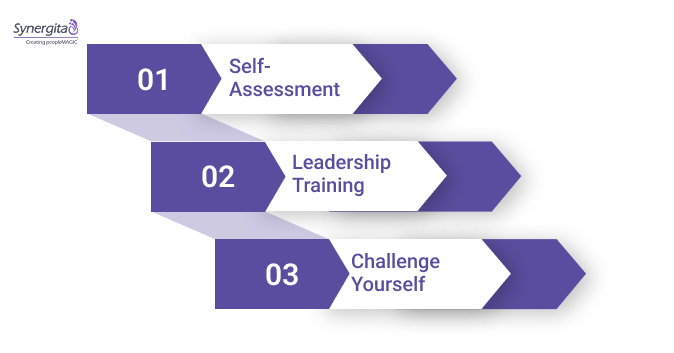
Mastering people management skills isn’t an overnight achievement. You need to take a journey of continuous growth and self-improvement. So, how can you start improving your leadership and people management skills today?
So, here are a few tips to strengthen your leadership and people management skills:
1. Self-Assessment and Leadership Tools
The first step in strengthening your leadership abilities is self-awareness. You can’t improve what you don’t recognize. Self-assessment tools are invaluable for identifying strengths and weaknesses in key areas like communication, emotional intelligence (EQ), and conflict management.
These tools help you see where you’re excelling and where you need to invest more time and energy. Once you identify gaps, you can take focused actions to improve.
Use tools like the 360-degree feedback system from Synergita to get a holistic view of your leadership effectiveness. Don’t hesitate to ask your seniors to share their honest opinion.
2. Leadership Training Programs
Engaging in targeted leadership training is crucial to developing the skills necessary for strong leadership. These leadership programs should equip you with practical techniques to manage your team effectively.
These programs often focus on areas like team dynamics and conflict resolution, equipping you with the tools to lead effectively in any situation.
Start educating yourself with online courses or self-paced learning programs focused on leadership development. Here’s a list of a few popular self-paced courses to start learning from leadership and people management skills:
- Harvard Business School Online‘s Leadership Principles
- Coursera’s Leadership Courses
- edX Leadership Programs
Relying solely on your past experience or trial-and-error methods may not be enough to master people management in a rapidly changing work environment.
3. Challenge Yourself
The best way to grow as a leader is by stepping outside your comfort zone. Challenge yourself by taking on new leadership responsibilities and learning from the mistakes you make along the way.
Growth happens when you challenge your existing assumptions and continuously test your leadership skills in real-world scenarios.
This proactive mindset will help you stay adaptable and resilient, helping you to lead through any challenge. Volunteer to lead new projects or initiatives that require different leadership skills. Set personal leadership goals that challenge you to address areas where you feel less confident.
Without challenging yourself, you risk stagnation and missing out on opportunities for meaningful growth, which can ultimately hold you back.
People management is a multifaceted challenge that requires the right strategies to bring success. But what if you could simplify the process, making it more impactful for you and your teams? The good news is, you don’t have to do it alone.
How Does Synergita Help Manage People Effectively?
With Synergita, you can take your leadership to the next level, turning challenges into growth opportunities for your team and driving business success. Synergita’s team understands the tight schedule managers have. So, to lighten their burden, here’s what this platform offers:
1. Performance Management
Managing employee performance can be time-consuming and often feels like juggling multiple responsibilities. With Synergita’s Perform platform, performance management becomes effortless. This tool automates the appraisal process and goal tracking, ensuring that managers have a clear and real-time view of employee progress.
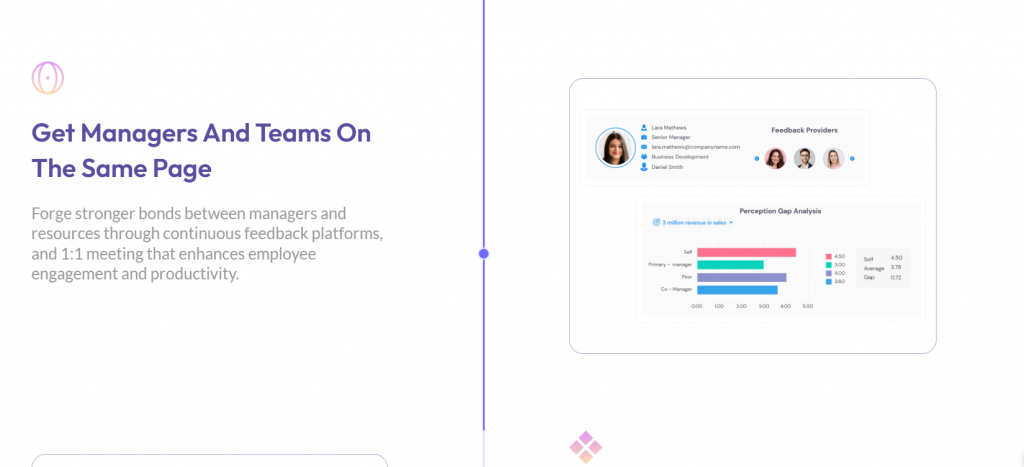
2. Having Transparent Communication
With features like AI-powered OKR assistance, Synergita ensures that all team members are aligned, receiving clear and actionable updates on their progress. The real-time reporting dashboard enables managers and employees to stay informed, promoting transparency and minimizing miscommunication.
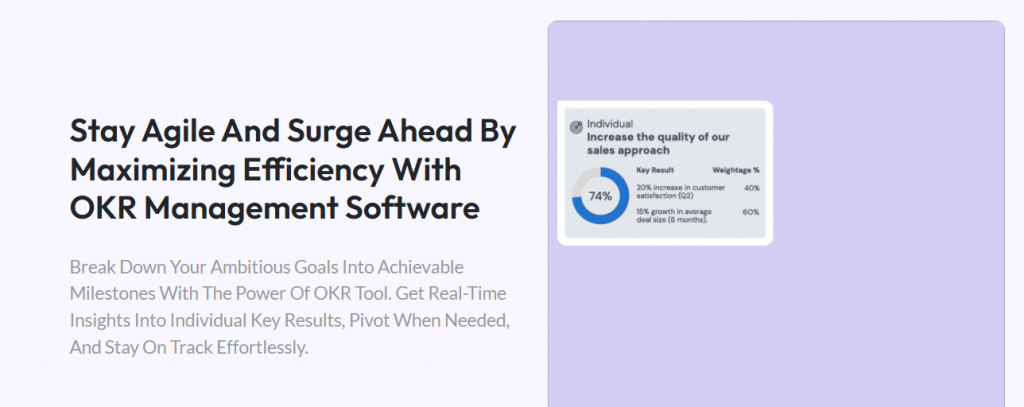
3. Simplifying Conflict Resolution
Conflicts are inevitable, but mishandling them can lead to long-term damage to team dynamics. Unresolved conflicts can lead to disengagement, reduced collaboration, and even high turnover.
Synergita’s E-communication feature helps track the “read” status of corporate communication emails. You can access a complete repository of HR emails and metrics that give insights into email open rates and reader engagement.
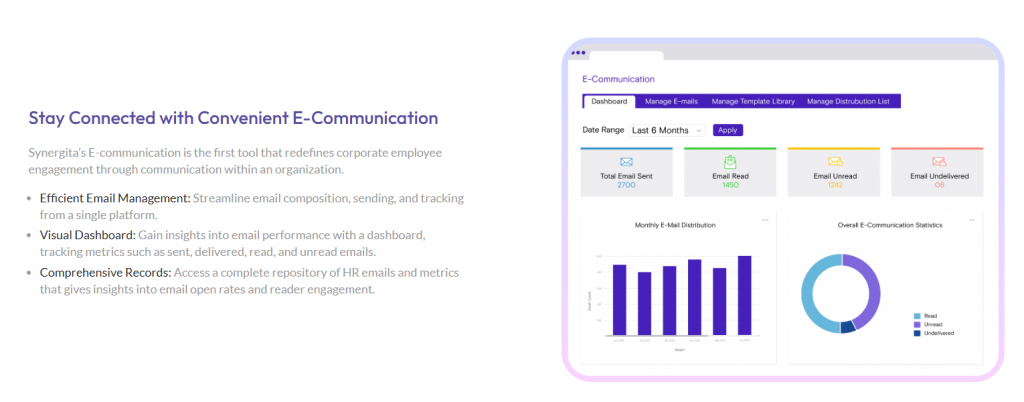
4. Supporting Employee Development
Employees want to grow. But how do you ensure they receive the coaching and development opportunities they need to thrive in their roles? Traditional development plans can be too generic or too slow to adapt to individual needs.
Synergita’s personalized coaching and skill training features allow managers to identify each team member’s strengths and areas for improvement. The HiPo score also helps identify high-potential employees who need focused development to maximize their impact.
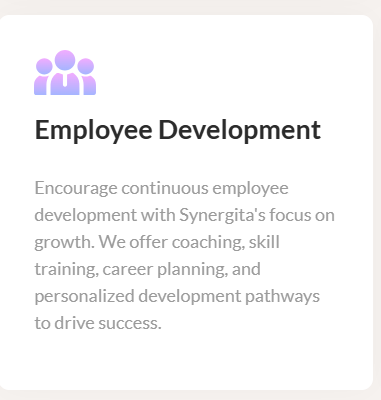
Synergita’s comprehensive suite of tools helps competent managers like you to meet the demands of modern people management.
Revamp Your Leadership Skills Now
People management challenges are real obstacles that every leader faces. However, these problems don’t have to hold you back. With Synergita, you gain powerful tools that solve various issues directly. This platform organizes performance management and supports continuous development.
In this way, you can focus on crucial tasks while Synergita makes your skill learning automatic and hassle-free with its amazing features. You build stronger, more motivated teams without the constant worrying about misalignment in goals throughout the team.
Take control of your people management today by becoming a true leader. Book a call to discover how Synergita can change your leadership approach.
FAQs
1. What are the most important skills for a people manager to have?
Key skills include communication, emotional intelligence, conflict resolution, delegation, and providing constructive feedback.
2. How can I improve my communication skills with my team?
Practice active listening, be transparent, tailor your message to your audience, and encourage open dialogue.
3. How do I handle a conflict between two team members effectively?
Address the issue early, listen to both sides, stay neutral, and work together to find a solution.
4. What is emotional intelligence, and why is it crucial for leadership?
Emotional intelligence (EQ) involves recognizing and regulating your emotions as well as those of others. It’s essential for building trust and resolving conflicts.
5. How can I create a feedback culture in my team?
Offer feedback regularly, ensure it’s constructive and actionable, and encourage employees to provide feedback as well.


